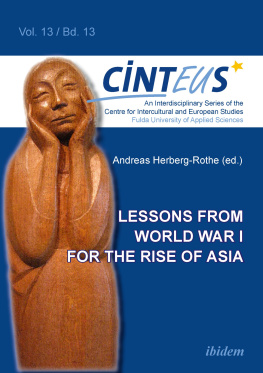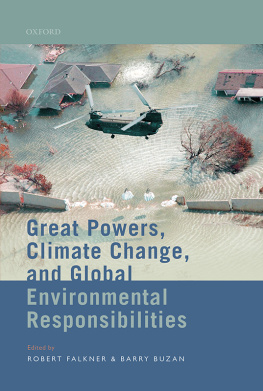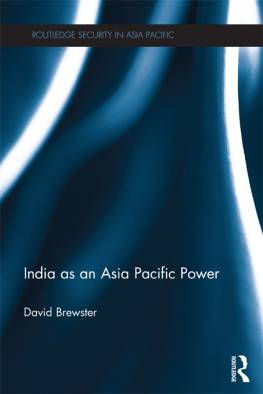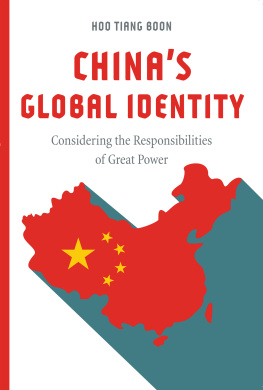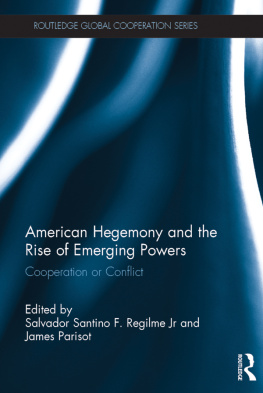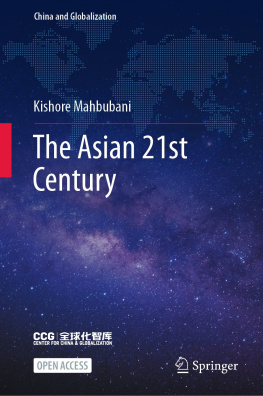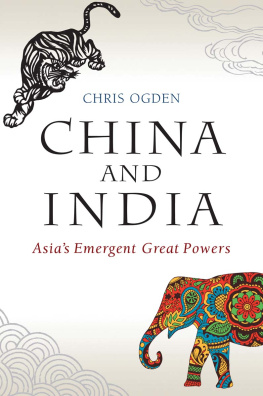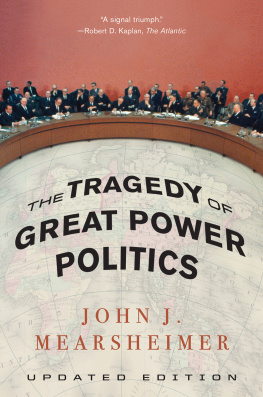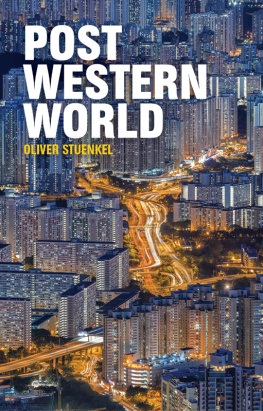World War I and the Current Conflicts in the World An Introductory Essay
Andreas Herberg-Rothe
All countries in the non-Western world have only one aim to be recognized again as equal by the leading Western powers in order to regain their former status as world powers and civilizations, which was lost in the process of European colonization and subsequent American hegemony. The desire for recognition is the driving force behind the economic and political rise of Asia. The same was true with respect to the conflict between established, rising, and declining powers before World War I. Are there lessons to be learned for our times from the devastating conduct and outcome of World War I? Is there only one lesson to be learned that you can learn nothing from history? Or are we doomed to repeat history if we learn nothing from it? History will not repeat itself precisely, but wars repeatedly occur throughout history, even great wars. We are living in an age in which a war between the great powers is viewed as unlikely because it seems to be in no one's interest, since the outcome of such a war would be so devastating that each party would do its utmost to avoid it. Rationality seems to dominate the assumptions and way of thinking in our times. But no war would have been waged if the losing side, or even both sides, had known the outcome in advance.
Historical analogies are not just a subject for historians or mere abstract they form our way of thinking about how to deal with todays conflicts. The most important problem for the political discourse of our times is whether an analogy to t he pre-World War I era or that of the pre-World War II era is appropriate for deal ing with the current conflicts in the world. If we use concepts and strategies with the main aim of avoid ing a repetition of totalitarian or imperialist movements and states, which led to developments similar to those resulting in World War II, a realist approach might be reasonable. This would mean rearmament, an arms race, deterrence, regime change , and even war to avoid a new world war. W r iting this political discourse , John Bolton, former US A mbassador to the UN, emphasized: To stop Iran's bomb, bomb Iran (New York Times, 26.3. 2015). But if the
current situation more closely resembles the pre-World War I era , these strategies and policies to avoid a similar development leading to World War II would eventually lead to a repetition of World War I.
1914, the beginning of the First World War, has not repeated itself as the start of the First World War in Asia in 2014. But there are striking similarities between the pre-World War I era and the curren t developments in Asia: the one- hundredth anniversary of World War I signifies the danger, not the inevitability, of a new world war in the decades to come. World War I is a symbolic representation of the risk that a war amongst the great powers could erupt even though nobody would benefit from it. It is the writing on the wall that rationality does not guarantee avoid ance of self-destruction. Although the 1914-2014 analogy has already passed, the more disturbing problem is marked by 1915 the year in which a still-limited European war escalated into a world war.
All predictions regarding a repetition of World War I in Asia are based on the assumption that it would be in no one's interest to fight a large-scale war that could lead to the destruction of great parts of Asia, Europe , and North America (the presence of weapons of mass destruction also worsens the prospects). But what if conflicts in Asia would not be fought to pursue national interests so much as recognition? That is, to be accepted as equal again after the humiliation over the course of European colonization and subsequent American hegemony? Indeed, acknowledgment of past suffering seems to be a trauma on the conscience of many Asian nations. Are those desires irrational or simply a different kind of rationality that we have to take into account?
During her last visit to Beijing in September 2012, then-US Secretary of State Hillary Clinton held a press conference in which she stated that the world would soon see, for the first time in history, that a rising power and an established power would not engage in a war. Of course, her statement was related to China and the US. Additionally, she compared the competition between China and the US with that of the Peloponnesian War between Sparta and Athens authoritarian Sparta against democratic Athens. Athens, the strongest city-state in Greece before the war, was reduced to a state of near-complete subjugation, while Sparta established itself as the leading power. Thucydides, the chronicler of the Peloponnesian War and one of the ancient world's most important historians, saw the initial cause of this war in the growth of Athenian power: "What made war inevitable was the growth of Athenian power and the fear which this caused in Sparta." Unlike Plato, though, Thucydides argues that it was not the striving for power in itself , but rather fear of losing power and, in the long term, fear of being oppressed, robbed of one's freedom, and enslaved that caused the escalation leading to war. In Thucydides's account, fear was the cause of war on both sides. Sparta was afraid of the growth of Athenian power and Athens was afraid of what might happen if it gave in to an escalating series of demands and threats without a foreseeable end.
No one wanted World War I to happen. Or, at least, no one wanted the kind of war that actually took place. The general assumption was that the conflict would be very limited. The Europeans who went to war assumed they would be home by Christmas 1914. We know now, of course, that World War I not only happened but that it also resulted in the self-destruction of the European powers in two world wars. World War I teaches the lesson that a limited conflict can escalate into a nightmare of millions of deaths and unspeakable suffering for which no rational explanation could be found. Military aims and strategies gained priority over meaningful political goals. Although the generals of the German E mpire believed that they were relying on Clausewitz's theory, they actually perverted it. Tactics replaced strategy, strategy replaced politics, politics replaced policy, and policy was militarized. It was as if everybody was saying that being at war means we stop thinking.
Perhaps the deepest hidden reason for this escalation was that each war party could admit neither defeat nor failure. A striking piece of evidence for this assumption is that the proclaimed war aims of the German Empire gained momentum the more unrealistic and irrational they became. The pride, honor , and identity of the German Empire prohibited the acknowledgment of defeat and failure. The same was true for Russia, France, England, the Habsburg Empire, and the Turkish Empire. Perhaps these Empires especially knew that their rule wouldn't survive if they had to acknowledge military defeat or failure, as either would have ruined their identity and they would have lost face (social recognition within their society and community). A military defeat would signal their symbolic death and so, the empires fought a war for life and death. This does not mean a simple equation of rising China with the then-rising German Empire. Although the actors then and today seem quite different, the dynamics generated by the conflict between emerging, rising, and declining powers are strikingly comparable.
Robert MacNamara, the US Secretary of State during the Cuban Missile Crisis, famously noted that it was sheer luck, not rationality, that prevented the escalation of that crisis into a world war. In 1983, the world needed more than good luck to avoid nuclear disaster. In the present day, all great powers are using military means to pursue their political and economic interests. But we simply should not allow ourselves to bet that military conflicts and strategies will not lead to the escalation of limited conflicts into great power wars.

